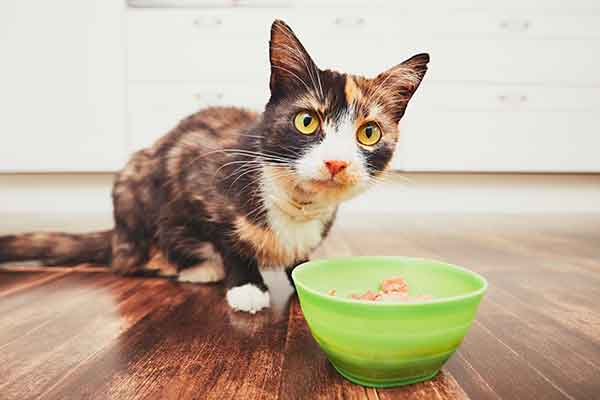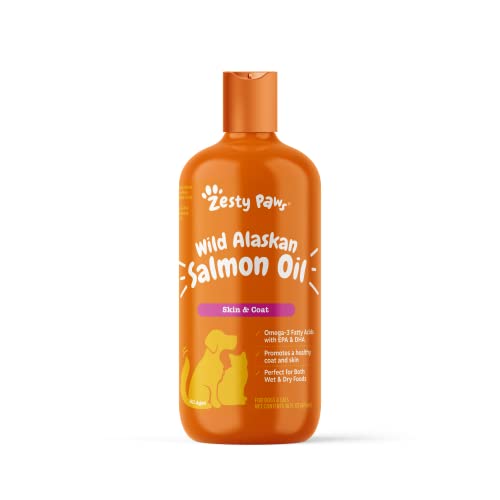Cats are prone to eating just about anything that they can get their paws (and tongues) on. In most cases, it’s not necessarily because they’ve developed a taste for that particular food but rather due to their sheer curiosity.
Indeed, you must have observed that your feline friend almost always comes begging for your food even if they’ve just eaten to their fill.
As a responsible cat owner, you probably already understand some of the foods that are considered cat-friendly and those that your kitto should not eat.
Sadly, numerous publications on pet-friendly foods hardly ever touch on spicy foods. Perhaps because there are hundreds of foods that are considered spicy. But should cats eat spicy food?
The answer is a resounding no. Cats should not eat spicy foods, primarily because their sensitive digestive system isn’t designed to process spices. Depending on how sensitive the cat’s stomach is, snacking on spicy foods might prove disastrous for the animal.
As you shall find, not all spicy foods are considered toxic for cats. But even those that are deemed fit for them may still carry some inherent risks, especially considering how those foods are prepared. Therefore, your best bet is to avoid feeding spicy foods of any kind to your kitto.
Read on for more insights on the possible effects of spicy foods for cats.
Table of Contents
Do Cats Like Spicy Foods?
Having already mentioned that cats should not eat spicy foods, you could now be wondering, can cats taste spicy food?
Well, the fact that cats should not eat spicy foods doesn’t mean that they can’t. Not only can cats taste spicy foods. They may as well develop a taste for these foods, thereby exposing themselves to even graver concerns.
However, not all cats will love spicy foods. Some may find the taste of spices too repugnant and develop an aversion for them, which is generally good news for both the cat and her owner.
Regardless of your cat’s response to spicy foods, it’s important to note that cats generally cannot taste spicy foods, at least not as effectively as humans can. A cat has less than 500 taste buds compared to humans who have nearly 9,000.
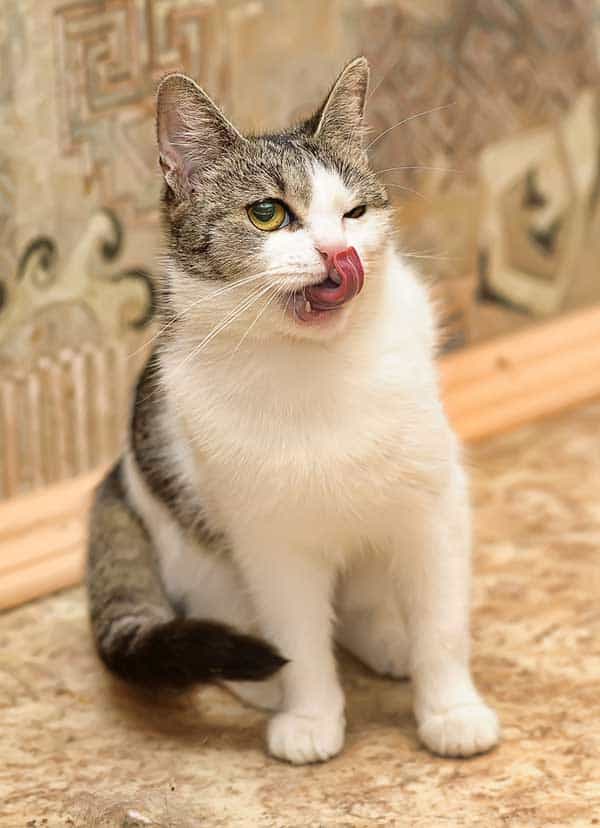
Instead of tasting exotic flavors, cats are more effective at tasting basic flavors like salty, bitter, and sour. That’s because the sense receptors located in their tongues are not well-developed, and understandably so.
As spicy foods don’t comprise a cat’s traditional staple diet, there was no need to develop a taste for these foods. The same applies to other exotic tastes like sugar. They, however, make up for that deficiency with their powerful sense of smell.
Now, the inability of cats to taste spicy foods means that they don’t savor these foods. Therefore, they can consume so much spicy food without realizing the concentration of flavors they’re exposing themselves to, further increasing their vulnerability.
- PETKIT Automatic Cat Dog Feeder Dispenser for dog cat Pets
Last update on 2024-07-09 / Affiliate links / Images from Amazon Product Advertising API
But why do most cats seem to have an affinity for spicy foods? The following are some of the reasons;
1. Interesting Aroma
Just like humans, cats are attracted to food by both the smell and taste of the food. But in their case, it’s the smell that does much of the work. A pleasant aroma can draw a cat out of hiding and even make her decline her usual meal.
Now, spicy foods tend to have a powerful and inviting aroma, the very one that cats love. As cats consume spicy foods, they’re particularly taken by the tingling sensation that these foods leave on their tongues.
That also explains why a cat can continue eating spicy foods even when it’s apparent that she has had her fair share. It appears that the tingling sensation, coupled with her inability to taste spiciness, affects the cat’s ability to tell that she has had enough.
Without supervision, the cat may develop addiction and dependency on spicy foods, opening her to risks of food poisoning from certain spices.
ALSO READ: Can Cats Eat Pancakes? OK to Share? [Best Advice]
2. Appealing Temperature
Most spicy foods are served warm. In fact, the spicy nature of these foods can keep them a bit warmer than the ambient temperature.
Generally, cats prefer warmer foods to colder ones. So, the temperature of spicy foods is also another attraction point for cats.
3. Great Texture
Spicy foods do not only give off a spellbinding aroma, neither are they just served at temperatures that cats consider ideal. These foods also come with great texture.
Although some spicy foods are purely vegan, others could be meat-based. Coupled with their tenderness, it’s clear to see why your cat may find these foods appealing.
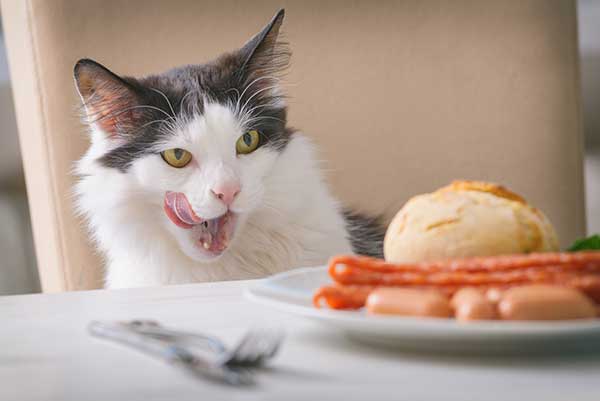
Possible Side Effects of Spicy Foods on Cats
One of the most frequently asked questions among cat owners is, is spicy food ok for cats? Although we’ve already highlighted it throughout this post, it warrants repeating that spicy foods are not okay for cats.
But what could happen if your cat eats spicy foods? The following are some of the common side effects to watch out for;
1. Gastrointestinal complications
As we indicated at the beginning, a cat’s digestive system isn’t cut for processing spicy foods. That’s primarily because cats consider spices to be exotic diets and as such, they haven’t developed a taste for them.
Consuming exotic foods like spices might trigger a host of gastrointestinal complications, including;
- Nausea which leads to a loss of appetite
- Diarrhea and vomiting, which lead to dehydration
- Constipation
- Abdominal pain
It’s worse if the food in question is plant-based. Remember, your feline friend is an obligate carnivore and can thrive exclusively on a diet of animal protein.
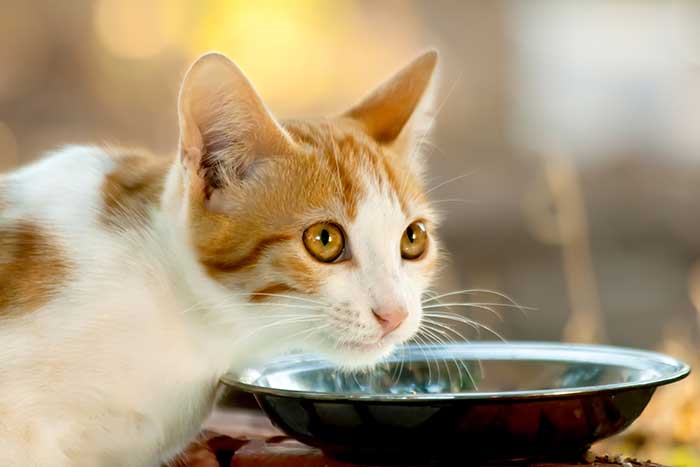
2. Throat irritation
Spicy foods may also irritate your cat’s tongue or throat, mostly due to the compound capsaicin. Depending on the concentration of spices in the food, the irritation could be too unbearable for the cat.
When your kitto’s tongue and throat are irritated, the animal will not eat or drink as he should. Worse yet, throat irritation could trigger incessant vomiting. Before you know it, you could be dealing with a very sick cat.
3. Allergic reactions
Since it may be the first time your cat is ever tasting spicy foods, there’s no telling how the cat’s body will respond to the food. The cat could suffer mild gastrointestinal issues, or she might develop full-blown hypersensitive reactions.
Examples of allergy symptoms that spicy foods might trigger in cats include;
- Dilated pupils
- Labored breathing
- Incessant meowing, hissing, or snorting
- Anxiety and irritability
- Skin rashes
- Runny nose and eyes
Now, each of the symptoms listed above could be mild or severe. It all depends on the amount of spicy food that your cat has consumed as well as her sensitivity to that particular food. Which begs the question – can spicy food kill cats?
Although death may not be instantaneous, a delay in seeking medical intervention could worsen the symptoms and your kitto may ultimately succumb.
- Goes Great with Any Meal - For pet parents looking for an alternative to capsules, raw treats, or soft chews, all it takes is a...
- A tasty & body nourishing treat for cats & dogs - Essential fatty acids for a healthy coat.
- Powerful Omega Fatty Acids - This premium fish oil liquid formula is loaded with the healthy Omega-3 fatty acid (with EPA and DHA)...
Last update on 2024-07-09 / Affiliate links / Images from Amazon Product Advertising API
What Spices Are Toxic To Cats?
Granted, most spices are generally toxic to cats. But some should be avoided at all costs. This section will attempt to uncover some spices that are toxic for cats by answering a series of frequently asked questions;
Can cats eat hot sauce?
While hot sauce may not be dangerous for cats if fed in small amounts, too much could cause excruciating pain in their stomach.
Can cats eat pepperoni?
Pepperoni is bad for cats, primarily because it’s usually high in salt. Consuming too much salt might lead to sodium ion poisoning in cats.
Sodium-ion poisoning manifests in the following symptoms;
- Diarrhea and vomiting
- Nausea and decreased appetite
- Lethargy
- Incoordination
- Seizures and tremors
- Frequent urination, which leads to excessive thirst sensation
- Coma
If untreated, sodium ion poisoning in cats is fatal.
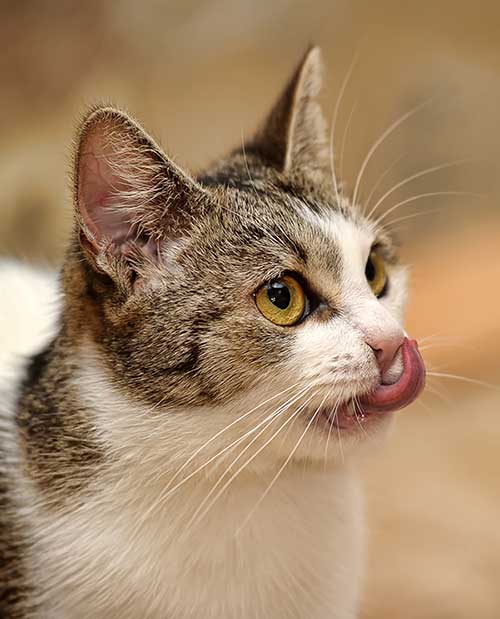
Can cats eat pumpkin spice?
Pumpkin spice isn’t harmful to cats in itself. The toxicity of this spice depends on the individual ingredients used as well as the amount that your cat consumes.
Common pumpkin spice ingredients like allspice, cinnamon, cloves, nutmeg, and ginger are highly toxic to cats.
Can cats eat garlic and onions?
This is probably the most toxic pair of all spices. Garlic and onion can damage your cat’s red blood cells, causing a disease known as Heinz body anemia.
Some of the signs of poisoning include;
- Vomiting and diarrhea
- Lethargy
- Ataxia (poor muscle coordination)
- Pale gums
- Discolored urine (usually red or brown)
- Hyper-salivation
- EASY TO USE, IMPACTFUL RESULTS: Collect a sample, package it up, and send it securely back. Just register, swab, return with the...
- MOST COMPREHENSIVE BREED & TRAIT: Our test distinguishes over 20+ distinct breeds and 50+ trait markers with the most...
- SCREEN FOR 40+ GENETIC DISEASES: Get peace of mind by screening for 64 health markers associated with 43 diseases for which your...
Last update on 2024-07-09 / Affiliate links / Images from Amazon Product Advertising API
Can cats eat cinnamon?
Cinnamon is another highly toxic spice for cats. It’s associated with liver damage, mouth and gum irritation (which can induce vomiting and diarrhea), and low heart rate.
Can cats eat nutmeg?
You may have often wondered, is nutmeg toxic to cats? Yes, nutmeg is toxic to our feline friends. This spice contains myristicin, a toxin that causes psychedelic effects, high blood pressure, abdominal pain, and elevated heart rate.
Can cats eat curry?
Despite its powerful aroma, cats should not eat curry. Usually, curry contains ingredients that are deemed harmful for cats, such as garlic and onion.
Can cats eat spicy tuna?
Tuna is excellent cat food. However, the same cannot be said about spicy tuna, as the spices used could be poisonous to cats.
Other common spices that cats should not eat include jalapenos and chili.
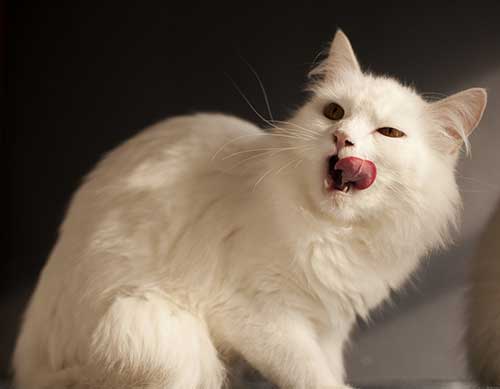
What to Do If Your Cat Eats Spicy Foods
It’s not unusual to come across a cat owner wondering, my cat ate some spicy food, what should I do?
If you discover that your cat has eaten spicy foods, the first action is to determine the potential toxicity of the food and the amount the cat has eaten.
If the spice consumed is toxic and the cat happens to have consumed way too much, you can induce vomiting by offering the cat hydrogen peroxide. As you induce vomiting, also supply the cat with enough water to prevent dehydration. You might also give the cat activated charcoal to slow down the absorption of the toxins into her body.
Remember, these measures are only meant to stabilize the cat so that you can make that necessary trip to the vet. When you visit the vet, remember to carry some evidence of the food the cat has eaten. That will allow him to prescribe the right treatment.
ALSO READ: Can Cats Eat Cereal? Here’s What Experts Think
Conclusion
Most spicy foods are highly toxic to cats. Even those that are deemed less harmful, such as chamomile, catnip, and dandelion, could still pose risks to your cat if consumed in large quantities.
You can prevent your cat from consuming spicy foods by clearing the table immediately after a spicy meal or storing spicy foods in inaccessible kitchen cabinets. But on the off chance that your feline friend eats spicy foods behind your back, take immediate remedial actions to prevent toxicity as you plan to visit your vet.
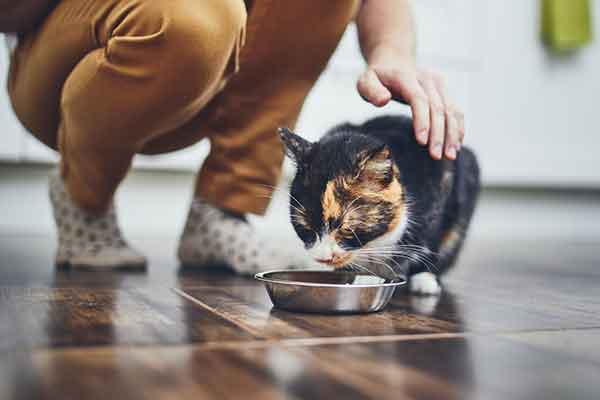
Checkout Our Favorite Cat Products
1. Best Online Course For Cat Parents
Our favorite: The Cat Language Bible (How to Finally Understand And Speak to Your Cat) – A new form of cat to human communication that many cat owners have dreamed about… but few have actually thought possible.
2. Best Vacuum to Tackle Pet Hair
Our favorite: Dyson Ball Animal 2 – Engineered for homes with pets. With features and tools that dig out dirt, hair and allergens everywhere your pet gets.
3. Best Immune Support For Cats
Our favorite: Tomlyn Immune Support – Best Supplement for Cats and Kittens.

